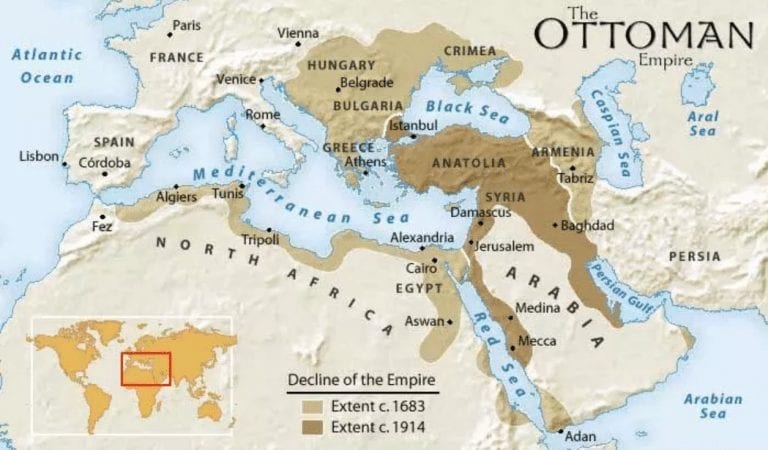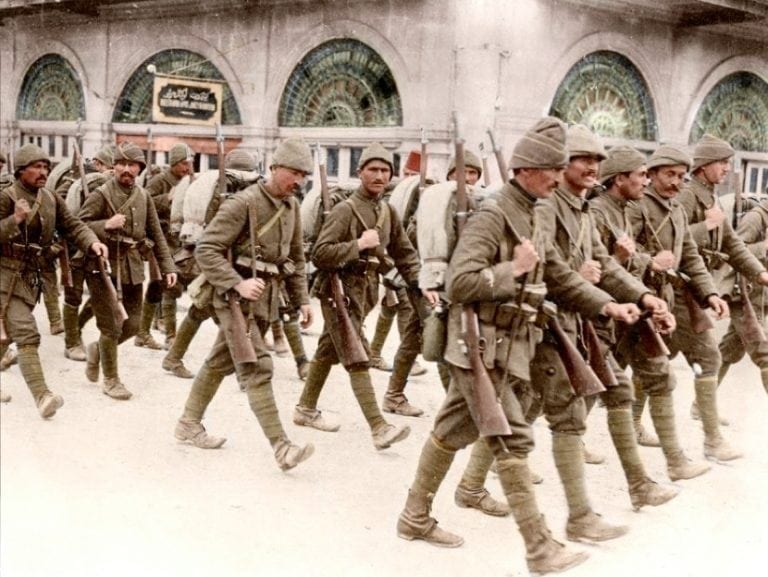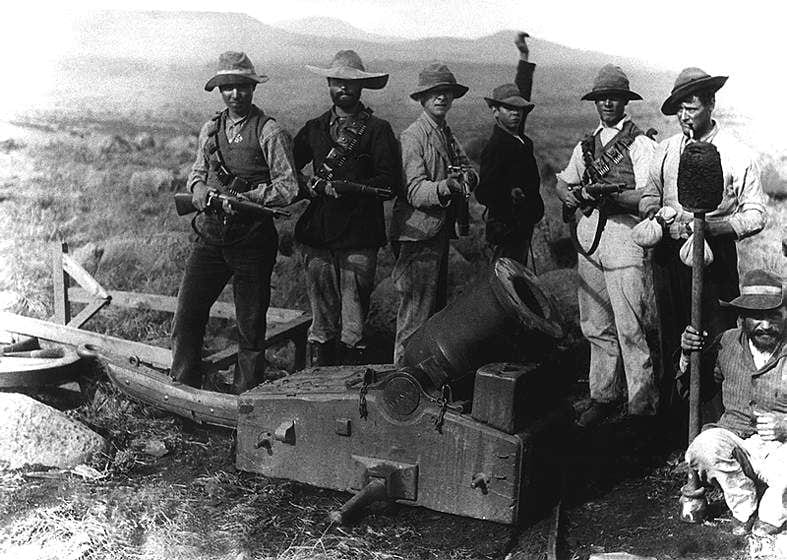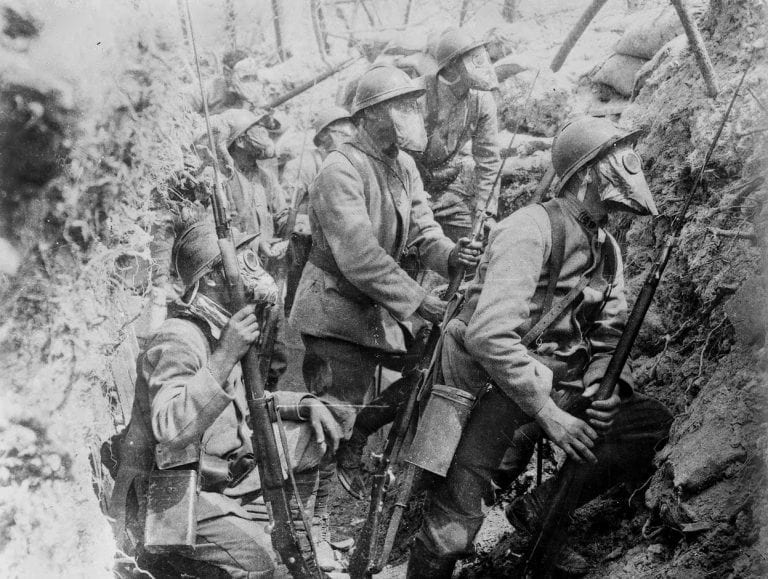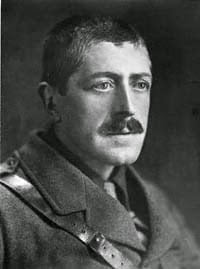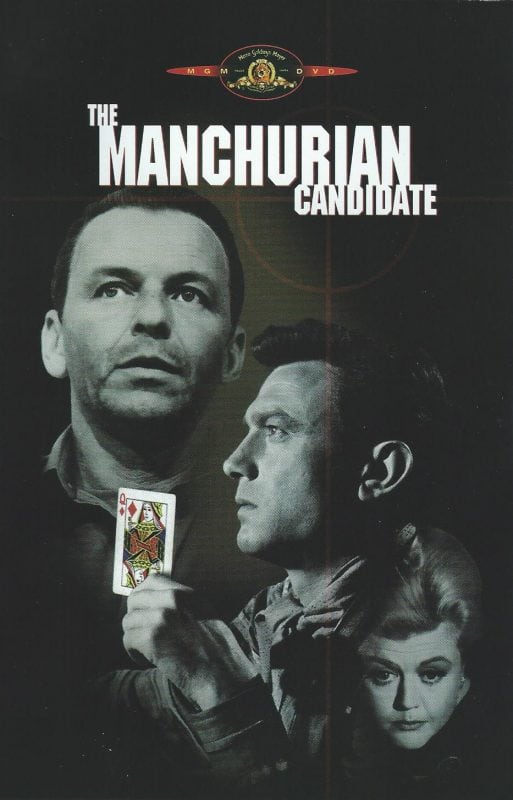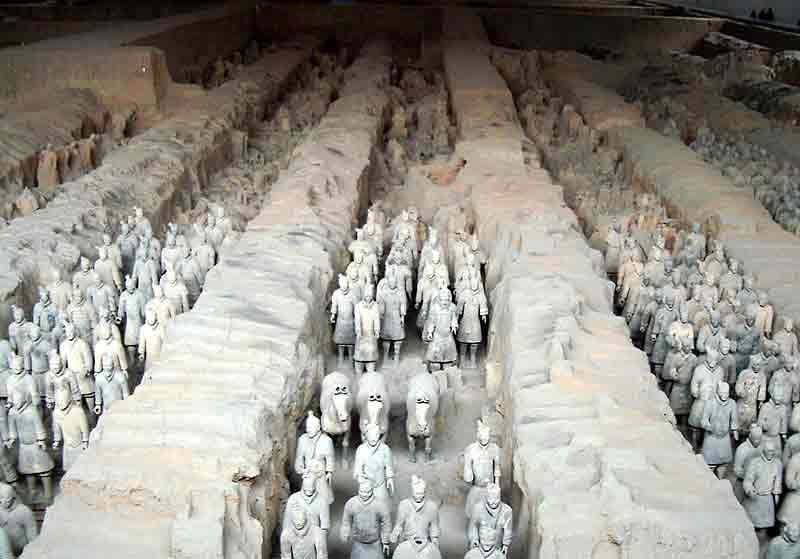
Terracotta army: Definitely not in Texas.
Europe is a continent and China is not only because the winners write the history books.
There is no scientific reason Europe is a continent: Europe is not a separate land mass, nor does it even sit on its own tectonic plate - we may as well call Canada a continent. China’s land mass area is nearly identical with Europe’s. What makes West Eurasia more special than East Eurasia?
Anyway, China is far more than just a country - it’s better to think of it like the Islamic World: “Chinese” is really a signifier of a common culture which transcends ethnicity, language, geography, an individual nation, an individual church, etc.
It’s absurd to think of China as homogenous: China has nearly 60 officially-recognised minorities today, and that’s after a couple millennia of consolidation. There are about 100 Indo-European languages (if we rightly exclude the Indo-Iranian branch - neither of which are in Europe, LOL), but hundreds of Sinitic languages still exist (and that’s even after excluding the Tibetan, South and Southeast Asian branches).
No Western dynasty or power could compare with the combined size, scope and duration of their Chinese counterparts. In the US they say, “Everything is bigger in Texas” - I have been to China, and they should say: “Everything is 10 times bigger than in Texas, in China”. Stand before the terracotta warriors at Xi’an and you’ll see what I mean.
Is it because Europe’s geography made it as isolated as a Greek island, and thus culturally unique? China has been far more isolated than Europe: it wasn’t accessible for sea trade until later in its history, most Chinese lived in only the northern plains until 1000AD, and there wasn’t sustained, firmly-intellectual contact with non-Chinese until the 7th century (Read Pepe Escobar’s fun, culturally-sprawling book 2030, which includes fascinating historical information about Xuanzang, who served the same “East-West” uniter role that Escobar does today, thankfully.)
Anyway, I think that Europe as an idea is bogus: it’s all about Mediterranean versus non-Mediterranean (Northern European) culture, and that was certainly their own view for many, many centuries.
Who is arrogant, who is defensive, who is right?
The arrogance of the West is that they believe they have the best system.
The arrogance of the Chinese is that they believe they are the best people.
(The arrogance of the Iranians is that they believe they are the best martyrs, when they are really just the best at believing that everyone else is the worst martyr!)
[dropcap]I[/dropcap] would say the Chinese are closer to their goal than the West, because there's absolutely no doubt in 2018 that the West European system (bourgeois capitalism) is not the best - even Westerners are revolting in White Trash Revolutions across the bloc.
The Chinese have always had an apparent disinterest in the rest of the world, and that seems to imply an arrogant self-glorification.
But they have some grounds for their belief: Their millennia-old meritocracy - the Civil Service Examination - made public service the highest good, was open to all, but tapped only a few. It’s a bit intimidating to think that one must compete with 1500 years of cumulative efforts of their best and brightest, no? Also, their neo-Confucian hierarchy of “scholar, farmer, tradesman, merchant, soldier” is such a high-minded inverse of the Western view that one surely does a double-take when learning about it for the first time. (China shows that such a system is actually feasible!)
And it’s especially hard to counter the arrogance of China in 2018, as they are the world's most successful socialist country ever, and also the most successful country today in a host of key areas.
Perhaps it is because I hail from a humble, small, self-denying people who only live to serve God and his children with good works (I’m such a good martyr!) that I have no sour grapes for China’s apparent victory over the West. Anyway, since 1979 Iran is, I am extremely proud to say, neither East nor West (bad martyr - so arrogant!).
White Trash conundrum: Where do humble people learn when no learning is available?
[dropcap]T[/dropcap]he problem is: Since 1949 it has been virtually impossible to find any English-language studies of China which did not primarily exist to elevate the West over China.
All the West has - or wants - when it comes to China analysts is either an alarmist or a denier. So from academia to journalism {except for leftist studies and books]- prior to the internet - you had no chance to find honest reporting on China or from China.
The average Westerner knows seemingly nothing of Chinese history other then the idea of an imperial emperor and a farmer in a huge bamboo hat…and China is a continent!
Ignorance is dangerous: Even if the West wanted to defeat China - and Obama’s (failed) “Pivot to China” shows that they do - they could not, because they do not even know their enemy. Such ignorance has already led them to catastrophic bloodletting in Indochina and Korea (and Afghanistan, Iran and elsewhere).
The alternative to scholarship which exists to elevate the West over China is a scholarship which sympathetically tries to understand China on its own terms and merits. Thankfully for those who want to learn about China - in 2018 we finally have this option.
How does one become a ‘doyen’ on China? You don’t get honest, dammit!
This is the first of a 8-part series which compares the West’s old scholarship on China with the new scholarship which…it just can’t suppress anymore.
Being interested in China, many years ago I asked a professor-friend in academia who taught Chinese history for a top comprehensive history on that little hamlet. He suggested: China: A New History by John King Fairbanks (2nd edition 2006).
I can see why this is a standard university-level textbook - it ticks all the establishment boxes: Fairbanks was educated at Exeter and Oxford, became Harvard’s first-ever China scholar, was known as “the West’s doyen on China”, and this book was his “masterwork” which killed him - he died of a heart attack the day he submitted it to his publisher.
My condolences. But while it may be fine on the bone oracles of the Shang Dynasty, it is rather pure junk when it comes to dealing with modern China.
But I figured that going in: I did not expect anything but a rabid fear of Red China, the casual arrogance that the Western model is superior and a total glossing over of both Communist China’s successes & the West’s crimes in China.
I wanted the academic viewpoint because I didn’t expect much from Western journalists, who I know already genuflect at the altar of the Fairbanks-types (dead or alive).
If you do look to journalists, the only comprehensive history on China which is ranked more popular (just slightly) on Amazon than Fairbanks’ academic work is John Keay’s China: A History. Keay is a longtime reporter for The Economist, which is as editorially-sympathetic to Red China as is the CIA (or as is Harvard’s establishment).
Clearly, selecting Fairbanks as a “standard bearer” for Western scholarship on China is fair and appropriate for a series such as this one.
On the other side, open-minded readers finally have new, better, accurate resources, but it is best exemplified by Jeff J. Brown’s truly indispensable China is Communist, Dammit! (2017).
Brown comes from two fundamentally different places than Fairbanks: the outside and the inside.
Brown is not trying to join the establishment, apparently feels no responsibility to unquestioningly uphold it…and thus has all the editorial control of an outsider; Brown is also living inside China, and it seems fair to assume that he has to actually be sympathetic and understanding of those around him, in order to avoid repeated bouts of culture shock and homesickness.
People will say that Brown’s title shows his bias…and I see nothing wrong with that accusation nor the title itself. “Objective journalism” is equal parts goal and myth: “One person’s ‘freedom fighter’ is another person’s ‘terrorist’”, and I learned that on the very first day of journalism school.
I actually object to Fairbanks’ title far more. It should have been: China: A Rewritten History, because it certainly is not the history the Chinese know and believe - it’s the Chinese history the West wants to believe. And that is unfortunate for Fairbanks and his readers…but it is also exactly why Fairbanks gets the laurels while Brown is probably hoping just a few people actually buy his book, dammit!
(Is Brown secretly 1/8th Iranian or something? What a martyr! Sell out already, sheesh!)
 The beauty of Brown's book is that it helps provide a balance which anyone interested in China has long been lacking and desiring. It is truly a one-of-a-kind book, and I would not be surprised if it gets translated widely because it is so very necessary in 2018. In short: the book contains truly excellent analysis, but it’s especially unique because of the sheer number of monumental facts and in-depth anecdotes which non-Chinese refuse to admit or discuss - where else can they be found but in this book? (Indeed, how can one ever have “excellent analysis” if they don’t have all the facts?)
The beauty of Brown's book is that it helps provide a balance which anyone interested in China has long been lacking and desiring. It is truly a one-of-a-kind book, and I would not be surprised if it gets translated widely because it is so very necessary in 2018. In short: the book contains truly excellent analysis, but it’s especially unique because of the sheer number of monumental facts and in-depth anecdotes which non-Chinese refuse to admit or discuss - where else can they be found but in this book? (Indeed, how can one ever have “excellent analysis” if they don’t have all the facts?)
Brown does not work for The Economist, so the mainstream media is never going to review his book. Yet he will go down as one of the “first movers” in the development of a new trend: Western analysts who gave up on attacking China.
Why you should read all 8 parts - think of what you’ve been missing!
Even before reading either Brown’s book or this series, I think one must concede: Year after year and decade after decade, the West has underestimated the vibrancy, stability and success of the Chinese model.
It is therefore fair to conclude that their analysis is fundamentally flawed in some way, so it would be useful to you to re-examine their foundations.
The aim of this series is two-fold:
Firstly, it will compare how the two very different authors analyzed the three primary events of modern China - the Great Leap Forward, the Cultural Revolution, the legacy of Mao - and secondly it will synthesise the very different groups of facts, anecdotes and analysis presented by these two authors in order to arrive at: modern analytical conclusions about China, possible parallels of the Chinese experience with other countries, and continue with the ongoing modern debate of socialism versus capitalism.
In short, by holding up the old and new scholarship on China one can see which is accurate and which is not, and why. By unlearning bad scholarship on China and learning new, good scholarship on China, we can confidently move forward towards greater global understanding.
China is daunting - after all, how can the West understand a China which has been culturally anti-capitalist since ’49…BC? True, modern, unbiased understanding of any continent is a major task, but quite an edifying one.

A previous book, China Rising, Capitalist Roads, Socialist Destinations, was the first volume to examine China's society comprehensively.
The bottom line is that the Western establishment’s view is so ideologically-driven, so unsympathetic, so wilfully opposed to accepting the native’s view of themselves, that it can fairly be called “extremist”. (An irony is that some will view this statement as unfair, yet will will label Brown’s work “extremist” without hesitation….)
Ultimately, extremism is a tactic used to confuse the issue and deliberately reduce understanding…and that’s what this series tries to subvert.
The credit goes to the modern scholarship of those like Brown’s, which does something which 20th century scholars did not want to do: clarify the impressive humanity of 21st century China.
The reality is that the West has a huge “mutual knowledge gap” due to their vast anti-Communist China campaign. Rest assured that China knows all about the last 500 years of Western history, which it experienced first-hand during their 110 years (1839-1949) of Western & Japanese control (many include Japan with the West, quite fairly) which they remember as the “century of humiliation”.
That’s a a pretty harsh assessment of themselves for the Chinese to carry around, no?
But China is serious business….Thankfully, today we can finally access authors like Brown, who have compiled superb, comprehensive scholarship to allow today’s readers to grant China the seriousness and honesty it deserves. And the Fairbankses of the Western world are everywhere else…providing copy and rubber-stamping diplomas.
Whether or not we choose to apply modern China’s solutions to our native problems is another question, and up to the reader, but willfully ignoring their solutions is so prejudiced that it cannot honestly be called “scholarship”.
***********************************
This is the 1st article in an 8-part series which compares old versus new Western scholarship on China.
Here is the list of articles slated to be published, and I hope you will find them useful in your leftist struggle!
Old vs. new scholarship on the continent of China: an 8-part series
Daring to go beyond Western propaganda on the Great Leap Forward’s famine
When Chinese Trash saved the world: Western lies about the Cultural Revolution
Mao’s legacy defended, and famous swim decoded, for clueless Western academics
The Cultural Revolution’s solving of the urban-rural divide
Once China got off drugs: The ideological path from opium to ‘liberal strongman’ Macron
Prefer the 1% or the Party? Or: Why China wins
China's only danger: A 'Generation X' who thinks they aren't communist
 In his zeal to prove to his antagonists in the War Party that he is as bloodthirsty as their champion, Hillary Clinton, and more manly than Barack Obama, Trump seems to have gone “play-crazy” — acting like an unpredictable maniac in order to terrorize the Russians into forcing some kind of dramatic concessions from their Syrian allies, or risk Armageddon.However, the “play-crazy” gambit can only work when the leader is, in real life, a disciplined and intelligent actor, who knows precisely what actual boundaries must not be crossed. That ain’t Donald Trump — a pitifully shallow and ill-disciplined man, emotionally handicapped by obscene privilege and cognitively crippled by white American chauvinism. By pushing Trump into a corner and demanding that he display his most bellicose self, or be ceaselessly mocked as a “puppet” and minion of Russia, a lesser power, the War Party and its media and clandestine services have created a perfect storm of mayhem that may consume us all.— Glen Ford, Editor in Chief, Black Agenda Report
In his zeal to prove to his antagonists in the War Party that he is as bloodthirsty as their champion, Hillary Clinton, and more manly than Barack Obama, Trump seems to have gone “play-crazy” — acting like an unpredictable maniac in order to terrorize the Russians into forcing some kind of dramatic concessions from their Syrian allies, or risk Armageddon.However, the “play-crazy” gambit can only work when the leader is, in real life, a disciplined and intelligent actor, who knows precisely what actual boundaries must not be crossed. That ain’t Donald Trump — a pitifully shallow and ill-disciplined man, emotionally handicapped by obscene privilege and cognitively crippled by white American chauvinism. By pushing Trump into a corner and demanding that he display his most bellicose self, or be ceaselessly mocked as a “puppet” and minion of Russia, a lesser power, the War Party and its media and clandestine services have created a perfect storm of mayhem that may consume us all.— Glen Ford, Editor in Chief, Black Agenda Report 






